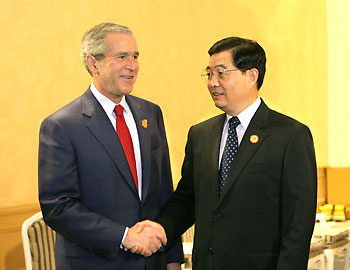
Chinese President Hu Jintao (R) shakes hands with U.S.
President George W. Bush during their meeting on the sidelines of the 14th
Economic Leaders' Meeting of Asia-Pacific Economic Cooperation (APEC) in Hanoi,
Nov. 19, 2006. -Xinhua
Chinese President Hu Jintao and US President George W. Bush agreed in
Hanoi yesterday to further promote Sino-US relations and exchanged views on
the nuclear issue on the Korean Peninsula and the Iranian nuclear issue.
The two presidents held talks on the sidelines of the two-day 14th Economic
Leaders' Meeting of the Asia-Pacific Economic Cooperation (APEC) forum which
began on Saturday.
SINO-US RELATIONS
Hu said China and the United States, as stakeholders and constructive
cooperation partners, should strengthen dialogue, mutual trust and cooperation
on major issues concerning the whole world and the common interests of mankind,
and properly settle their disputes, so as to push forward bilateral constructive
and cooperative relations.
Hu said both sides should, from a strategic and long-term perspective, adhere
to the correct path of developing bilateral ties and promote bilateral
constructive cooperation in an all-round way.
He said the Taiwan question should be properly handled as Bush and the U.S.
government have repeatedly reiterated that they stick to the one-China policy,
abide by the three Sino-U.S. joint communiques and oppose "Taiwan independence."
Hu expressed the hope that the U.S. side would honor its commitment and not
send wrong signals to "Taiwan independence" secessionist forces, so as to
safeguard Sino-U.S. strategic interests.
Hu said the two sides should also strengthen cooperation in the Asia-Pacific
region so as to jointly safeguard and promote peace, stability and prosperity in
the region.
The two countries should enhance economic and trade cooperation of mutual
benefit, as well as exchanges and cooperation in wide-ranging fields such as
anti-terrorism, non-proliferation, defense, energy, aerospace, science,
technology, education, culture, health and youth, Hu noted.
Agreeing with Hu on strengthening bilateral cooperation in various fields,
Bush said the U.S. side is ready to conduct various strategic dialogues and
exchanges at various levels with China.
He said the U.S. side understands the sensitivity of the Taiwan question and
its possible impact on the U.S.-China relations, and that the U.S. policy on
this question remains unchanged.
Bush said bilateral economic and trade cooperation is dynamic, and that the
U.S. side welcomes China's development and does not worry about competition
brought about by China's development.
He said both sides would settle their economic and trade disputes on the
basis of mutual respect.
During the meeting, Hu also voiced his pleasure at the steady and sound
growth of bilateral relations.
Bush said Sino-U.S. relations, an important component of U.S. foreign policy,
have developed well and the U.S. side will make due efforts to maintain good
relations with China.
He said strengthening bilateral cooperation is conducive to world peace and
prosperity, as well as the settlement of major international and regional
issues.
NUCLEAR ISSUE ON KOREAN PENINSULA,
IRAN
During the meeting with Bush, Hu also called for the settlement of the
nuclear issue on the Korean Peninsula and the Iranian nuclear issue through
dialogue and negotiation.
"We should stick to the direction of solving the nuclear issue on the Korean
Peninsula through dialogue," Hu said.
The parties concerned should seek to solve the issue with wisdom and patience
to realize the denuclearization of the Korean Peninsula as soon as possible, he
said.
China is willing to work with all parties concerned, including the United
States, to promote the resumption of the six-party talks, reaffirm the
commitments made by all sides in a joint statement adopted in September, 2005,
and push forward the talks to make tangible progress, he said.
The six-party talks, which involve China, the Democratic People's Republic of
Korea (DPRK), Russia, the United States, Japan and South Korea, have been
stalled since November last year.
The international community should send a common signal, urging the DPRK to
take right actions and move in the right direction, Bush said, adding that
Washington hoped to seek a peaceful solution to the issue.
On Iran's nuclear issue, Hu urged calmness and patience from parties
concerned to maintain engagement and dialogue with Iran, seek an effective
solution to the issue, and create conditions for the resumption of relevant
talks.
Bush said the United Nations Security Council should take a firm and
reasonable position on the issue.
The Chinese president also briefed his U.S. counterpart on China's efforts to
build a harmonious society.



